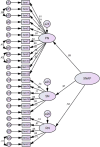Cultural adaptation and validation of Turkish version of The Spiritual Needs Assessment for Patients (T-SNAP) scale in patients with cancer
- PMID: 40696314
- PMCID: PMC12281676
- DOI: 10.1186/s12904-025-01765-8
Cultural adaptation and validation of Turkish version of The Spiritual Needs Assessment for Patients (T-SNAP) scale in patients with cancer
Abstract
Background: The patients may attribute different meanings to diseases and develop various coping mechanisms to cope with them depending on the geography and cultures. In this respect, spirituality is an important dimension that patients frequently refer to in chronic and life-threatening diseases such as cancer. In the Turkiye, the availability of measurement tools designed to assess patients' spiritual needs remains limited. This study aimed to adapt the The Spiritual Needs Assessment for Patients scale into Turkish and examine its psychometric properties.
Methods: The scale adaptation process involved the following steps: (1) translation and cross-cultural adaptation and (2) psychometric evaluation, including factor analysis, reliability analysis, and inter-item correlation assessment. 453 patients with cancer were included in the study. The data were collected in 2023. The participants were patients with cancer who were receiving outpatient and inpatient treatment in the medical oncology and hematology clinics of three university hospitals in Turkiye. Data collection tools included the Patient Information Form and the Spiritual Needs Assessment for Patients scale. Validity was examined through content and structural validity assessments, while reliability was measured using Cronbach's alpha coefficient and test-retest reliability.
Results: The content validity index of the T-SNAP was calculated as 80.54%. The exploratory factor analysis indicated 3 factors (psychosocial needs, spiritual needs, religious needs) with 23 items. The combined three factors accounted for 66.92% of the total variance. The factor loadings ranged from 0.43 to 0.96. The Cronbach's alpha coefficient was found to be 0.95, and the test-retest reliability score was 0.96.
Conclusions: The findings suggest that the T-SNAP scale is a reliable and valid tool for assessing the spiritual needs of patients in Turkiye.
Keywords: Cancer; Nursing; Nursing care; Spiritually; Spiritually care.
© 2025. The Author(s).
Conflict of interest statement
Declarations. Ethics approval and consent to participate: The study conformed to the principles of the Declaration of Helsinki. To conduct the validity and reliability study of the T-SNAP, formal permissions were obtained. The adaptation of the scale was authorized by Sharma et al., ethical approval was granted by the ethics committee of the Batman University under decision number 2021/03 - 06, and institutional permissions were secured from the hospitals where the study was conducted (Institution (1) protocol number: E- 42190979 - 000 - 2300097844, Institution (2) protocol number: E- 28050591 - 044 - 389764, and Institution (3) protocol number: E- 75626256 - 051 - 2500042). Additionally, written informed consent was obtained from all participants before inclusion. Consent for publication: Not applicable. Competing interests: The authors declare no competing interests.
Figures
Similar articles
-
Validity and reliability study of the Turkish version of the autism spectrum knowledge scale.Acta Psychol (Amst). 2025 Aug;258:105204. doi: 10.1016/j.actpsy.2025.105204. Epub 2025 Jun 25. Acta Psychol (Amst). 2025. PMID: 40570585 Review.
-
Validity and Reliability of the Turkish Version of the Dynamic Evaluation of Motor Speech Skill (DEMSS-TR) Test for Children With Speech Sound Disorders.Int J Lang Commun Disord. 2025 Jul-Aug;60(4):e70067. doi: 10.1111/1460-6984.70067. Int J Lang Commun Disord. 2025. PMID: 40583607
-
A New Measure of Quantified Social Health Is Associated With Levels of Discomfort, Capability, and Mental and General Health Among Patients Seeking Musculoskeletal Specialty Care.Clin Orthop Relat Res. 2025 Apr 1;483(4):647-663. doi: 10.1097/CORR.0000000000003394. Epub 2025 Feb 5. Clin Orthop Relat Res. 2025. PMID: 39915110
-
Psychometric properties of the Persian version of the training needs assessment for critical care nurses.BMC Med Educ. 2025 Aug 7;25(1):1149. doi: 10.1186/s12909-025-07657-y. BMC Med Educ. 2025. PMID: 40775627 Free PMC article.
-
Reliability, validity and feasibility of quality of life instruments for adult patients with cancer undergoing chemotherapy: result from a systematic review.Int J Evid Based Healthc. 2012 Mar;10(1):27-52. doi: 10.1111/j.1744-1609.2012.00252.x. Int J Evid Based Healthc. 2012. PMID: 22405415
References
-
- Rachel H, Chiara C, Robert K, Francesco S. Spiritual care in nursing: an overview of the measures used to assess spiritual care provision and related factors amongst nurses. Acta Bio Medica Atenei Parm. 2019;90(Suppl 4):44–55.
-
- Harrad R, Cosentino C, Keasley R, Sulla F. Spiritual care in nursing: an overview of the measures used to assess spiritual care provision and related factors amongst nurses. Acta Bio Medica Atenei Parm. 2019;90(4-S):44–55.
MeSH terms
LinkOut - more resources
Full Text Sources
Medical


